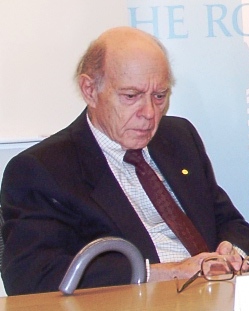A Quote by Jeffrey C. Hall
In any complex organism, brain formation and function must be controlled in part by genes.
Related Quotes
Complex organisms cannot be construed as the sum of their genes, nor do genes alone build particular items of anatomy or behavior by themselves. Most genes influence several aspects of anatomy and behavior as they operate through complex interactions with other genes and their products, and with environmental factors both within and outside the developing organism. We fall into a deep error, not just a harmful oversimplification, when we speak of genes "for" particular items of anatomy or behavior.
Yes, genes are important for understanding our behavior. Incredibly important - after all, they code for every protein pertinent to brain function, endocrinology, etc., etc. But the regulation of genes is often more interesting than the genes themselves, and it's the environment that regulates genes.
It's a very complex network of genes making products which go into the nucleus and turn on other genes. And, in fact, you find a continuing network of processes going on in a very complex way by which genes are subject to these continual adjustments, as you might say - the computer programmer deciding which genes ultimately will work.
Man as seen as an organism or man as seen as a person discloses different aspects of the human reality to the investigator. Both are quite possible methodologically but one must be alert to the possible occasion for confusion. (...) Seen as an organism, man cannot be anything else but a complex of things, of its, and the processes that ultimately comprise an organism are it-processes.
[G]enes make enzymes, and enzymes control the rates of chemical processes. Genes do not make "novelty seeking" or any other complex and overt behavior. Predisposition via a long chain of complex chemical reactions, mediated through a more complex series of life's circumstances, does not equal identification or even causation.
Most of our brain cells are glial cells, once thought to be mere support cells, but now understood as having a critical role in brain function. Glial cells in the human brain are markedly different from glial cells in other brains, suggesting that they may be important in the evolution of brain function.

































